Annette Bening Film Stars Don't Die in Liverpool
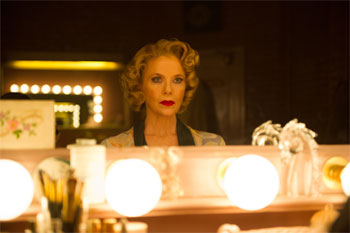
September 1981
Cast: Jamie Bell, Julie Walters, Vanessa Redgrave, Annette Bening, Stephen Graham, Frances Barber
Director: Paul McGuigan
Genre: Biography, Drama
Rated: M
Running Time: 105 minutes
Synopsis: A romance sparks between a young actor and a Hollywood leading lady.
Film Stars Don't Die in Liverpool
Release Date: March 1st, 2018
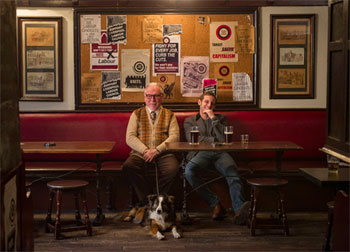 About The Production
About The Production
In late September 1981 Peter Turner received a phone call that would change his life forever. His former lover, Hollywood actress Gloria Grahame, had collapsed in a Lancaster hotel. She refused medical attention and instead reached out to Peter Turner, who at Grahame's request took her to his warm if chaotic family home in Liverpool.
The pair had met a few years previously, their paths crossing in a Primrose Hill guesthouse in which they were lodging. Peter Turner was an aspiring actor, Grahame a fading star. She had made her name in the Hollywood studio system, often playing the moll, the floozy or as Turner notes in his memoir -the tart with the heart,' appearing in a string of film noirs, including the likes of the sad and hauntingly romantic In a Lonely Place with Humphrey Bogart (shot by her husband at the time, Nicholas Ray) and the Fritz Lang classic The Big Heat opposite Lee Marvin.
Gloria shone in the likes of Crossfire, for which she was Oscar nominated, Naked Alibi and Sudden Fear, while her turn in The Bad and The Beautiful scooped her an Oscar win for Best Supporting Actress. She brought humour to the role of Ado Annie Carnes, the girl who -can't say no', in the film adaptation of the Rodgers and Hammerstein musical Oklahoma! and added plenty of vim to the part of the elephant girl in Cecil B. DeMille's The Greatest Show on Earth. She also featured as Violet in the Christmas-time favourite It's A Wonderful Life.
And yet she fell on hard times and in her 50s ended up working in smaller scale theatre productions in the UK. She was, as her landlady notes in the script for Film Stars Don't Die in Liverpool, -a big name in black and white films. Not doing too well in colour.' When Turner met her in his late 20s, he had no idea who she was. And yet these like-minded souls struck up a friendship, which then blossomed into a full-blown romance.
A move to New York followed, though their relationship did not last, collapsing under the weight of the couple's insecurities and Grahame's second diagnosis with cancer, a fact she kept hidden from Turner. It was only in the wake of her collapse in Lancaster on that fateful day in 1981 that Peter Turner learned the full extent of her health problems. Though their relationship had failed, their friendship endured and it was to Peter Turner she turned in her hour of need.
In 1986 Peter Turner published his memoir, entitled Film Stars Don't Die in Liverpool, which recounted his tale of love and loss with the former Hollywood star. It is an affectionate, moving and wry recollection of this unlikely story. And now, more than 30 years on, it comes to the big screen with Annette Bening starring as Gloria Grahame, Jamie Bell as Peter Turner.
The driving forces behind the screen adaptation are producers Colin Vaines and Barbara Broccoli. Barbara Broccoli had for a long time harboured ambitions to bring the Turner Grahame story to the big screen.
'I have wanted to make this film for over 20 years," Barbara Broccoli begins, 'It is very meaningful to me. I knew Gloria and Peter when they were together."
Broccoli got to know Turner when he was working on a series called Spearhead alongside her boyfriend at the time. 'I then met Gloria several times. She was such an extraordinary actress and such a lovely person. There was something captivating about her.
'Obviously, when Gloria died it was devastating and Paul McGuigan was bereft," Barbara Broccoli continues. 'But then quite some time later he showed us this manuscript and said that he had sent it off to a publisher. It was such a moving, simple, beautiful memoir." It was published by Pan Macmillan in the UK, Picador in US, and it received a positive reception. 'Paul McGuigan and I talked about making a film version and though it has taken a long time, we are finally here."
'I thought it was a really fantastic story and a completely unique book," Vaines says. 'I'd never read anything quite like it. It was a really unusual love story between two people from two entirely different worlds, and it was about the enduring power of love." Vaines could also see that audiences would readily connect with the character of Peter Turner. 'For most people he's an ordinary bloke and he's trying to make a living. He's doing okay, but something special happens to him and that can happen to people in all sorts of ways when you fall in love with somebody. And it just so happened that he met an extraordinary woman, who, as it turned out, had been a great Hollywood actress in the '40s and '50s."
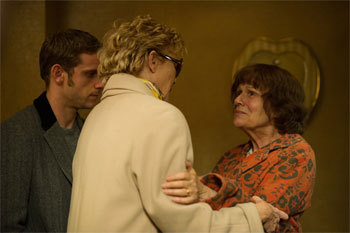 Around eight years ago Vaines revisited Peter Turner's book and says he was still struck by its potency. He saw that the rights were with Broccoli and asked her if she'd like to collaborate on the project, working with a young screenwriter called Matt Greenhalgh, who had penned the screenplays for Control and Nowhere Boy.
Around eight years ago Vaines revisited Peter Turner's book and says he was still struck by its potency. He saw that the rights were with Broccoli and asked her if she'd like to collaborate on the project, working with a young screenwriter called Matt Greenhalgh, who had penned the screenplays for Control and Nowhere Boy. 'There was something about Matt's writing that I responded to," adds Vaines, 'and I thought that he had exactly the right qualities for getting the story of Peter Turner. I knew he would understand both aspects of it " the world of the working class boy and also the world that she came from. So I asked Barbara if she was interested in working on this together, and I suggested Matt as the writer."
Broccoli loved the idea. She says Greenhalgh did a great job with the screenplay and she and Vaines were delighted Paul McGuigan wanted to direct. Vaines explains, 'Both Barbara and I felt that Paul brings this great visual quality to filmmaking but that he also has this great connection with the actors, and he really got the script."
Barbara Broccoli concurs. 'I had wanted to work with Paul for many years and getting him on board was a catalyst to getting the film made."
Filming Film Stars
For director Paul McGuigan the appeal of making Film Stars Don't Die in Liverpool lay in Grahame herself, and the fact that this fascinating part of her life story was told through Peter Turner's unique experience.
'Having worked in film for so many years I have watched a lot of Gloria Grahame's films," he says. 'She had this amazing life, which was somewhat controversial as well, but Peter Turner didn't know anything about her; it was in the days before the internet.
'I also liked the clean storytelling device of having this young man falling in love with her. And then the audience gets to know her through his eyes," he adds. 'I thought that was really nice, and it was a great book as well. Then Matt's script distils this story down even more; it is a very tight script."
Matt Greenhalgh, says that Peter Turner's book took him by surprise. 'I wasn't expecting this story at all," he says. 'And yet I could immediately see the potential in it. A story like this needs to have a certain amount of depth to grip the audience as you can't just play off Gloria's name. She is not that well known any more. It's not like she's Marilyn Monroe. It is testament to the book that you feel like it should be a movie when you read it." Paul McGuigan responded to Matt Greenhalgh's script immediately and had a clear and unique vision for how he wanted to tell this particular story. 'I didn't want to tell the story of who she was until Peter Turner found out who she really was," he says. 'I didn't want to do flashbacks to her life or to her movies."
Instead, Paul McGuigan chose to pay homage to a number of her famous works, especially those film noirs. 'I wanted a lot of the scenes to feel quite theatrical with a lot of them based in the studio."
In addition, he tipped his hat to Grahame's filmography by using back projection, a common technique in many of her film noirs. One notable example comes in a beach scene that Grahame and Turner share in Malibu, which is a specific reference to a classic Grahame-Bogart moment from In a Lonely Place.
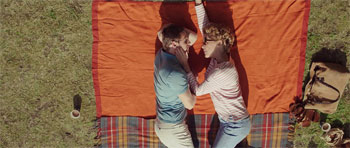 'We looked at a lot of the movies she did and we referenced a number of scenes from them, like that beach scene," Paul McGuigan says. 'I wanted to replicate that back projection like the way they used to do it the movies. I wanted that same kind of feeling.
'We looked at a lot of the movies she did and we referenced a number of scenes from them, like that beach scene," Paul McGuigan says. 'I wanted to replicate that back projection like the way they used to do it the movies. I wanted that same kind of feeling. 'Everything is done through the camera. Normally, you would use a green screen for a scene like that and then you'd fill it in later or you would actually go to the beach itself. But I liked the idea of having this sense of heightened reality."
Another idea that Paul McGuigan employed was to shoot one particularly important scene " the couple's break up in Grahame's New York apartment " from two different perspectives. This allows the audience to better understand why Grahame had to let Turner go.
Paul McGuigan explains, 'I show the same scene twice so that you see the break up from Peter Turner's point of view. You see the chain of events that ends up with them splitting up. And then ten minutes later you go back and we do it through Gloria's point of view. This allows you to understand why she had to let him go, and it's really clear, emotionally."
Gloria + Peter
Leading lady Annette Bening has long harboured ambitions to play Gloria Grahame in this story. In fact, she and Broccoli had first spoken about the role over 20 years ago. Annette Bening, however, would have been too young to play the part at that time. 'Annette Bening has always been the only person I would want to play this role," says Barbara Broccoli. She is such a great actress but also she really connects with the character in a profound way.
'She was really enamoured with Gloria and the complexities of Gloria as a screen goddess and also as a person. This isn't a biography. It is so much more. Annette Bening and I waited for the right time and that time is now."
Vaines says that Annette Bening's performance is exceptional. 'Annette Bening is extraordinary in the film," he says, 'and there's an element where she goes beyond acting to inhabiting." For four-time Oscar nominee Annette Bening, the long wait between her first conversations with Barbara Broccoli and the film going into production has been a real boon. 'The fact that Barbara Broccoli and I talked about it many, many years ago enriches the part," the actress says, 'because even if you are not sitting around thinking about it every day it goes into your unconscious and it percolates. It certainly did with me.
'The whole nature of the story and the unique, eccentric relationship that they had and what it meant to them and then how Peter wrote about it – that always stayed with me." Annette Bening's fascination with Grahame began when she was making the 1990 film The Grifters with director Stephen Frears. 'When I was working on that film Stephen mentioned her to me and he said, -Hey, you might want to have a look at her movies. The Grifters was a noir-esque movie and so it made sense to look at film noir anyway and the women of that period and the way that they were portrayed. Gloria, of course, holds a special place in that period.
'She had a really interesting presence on screen and she was a good listener. When you watch her you feel like there's an inner life going on and that is what is compelling about her."
According to Paul McGuigan, Annette Bening's knowledge of her real-life character was profound. He recalls visiting Annette Bening's home to talk about the film. 'And Annette Bening pulled out all these photos and books about Gloria," he remembers. 'She knew much more about her than I did. She had already asked people round Hollywood who knew her and who knew what she was like. She was asking them really pertinent questions."
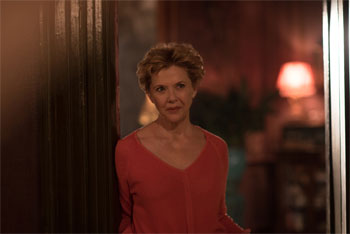 Paul McGuigan and all the key filmmakers also spent time with Peter Turner himself. Annette Bening, Paul McGuigan, Barbara Broccoli and Peter Turner all travelled up to Liverpool before production began and they knocked on the door of the very house that Turner's family had once owned, and in which Grahame had stayed.
Paul McGuigan and all the key filmmakers also spent time with Peter Turner himself. Annette Bening, Paul McGuigan, Barbara Broccoli and Peter Turner all travelled up to Liverpool before production began and they knocked on the door of the very house that Turner's family had once owned, and in which Grahame had stayed. 'This girl opened the door and she was so surprised," says Paul McGuigan. 'She sees Annette Bening and she goes, -What is going on here?' We asked if we could look round the house and she let us in. Much of the project was about following Annette Bening's nose and whatever she wanted to find out. It was important for her as an actress to dig deep."
Above all, Annette Bening wanted to be accurate. 'I wanted to be as truthful as I could but I didn't have a lot of people to talk to," she concedes. 'With many public figures, there is a lot of information out there and you find interviews and people talking about them. 'But with Gloria there isn't a lot so I had to take mostly from what Peter Turner described. I asked Peter Turner a lot of questions and I also respected his privacy. Peter Turner is very discreet. The book is very discreet."
'The way that Peter Turner saw her from the time that he had first met her until the end of the story has an incredible range," says Annette Bening, 'and the movie, I hope, reflects that. There is a journey that she goes through from the time they first met until the end.
'The story in the film is told out of sequence but I had to have it my mind as this arc. When you consider her state of mind there is no absolute answer because Gloria isn't telling the story. Peter Turner is telling the story so it's really his point of view."
With a story drawn from Peter Turner's memoir and told largely from his perspective, finding the right actor for the role was imperative. According to Barbara Broccoli, it was a difficult part to cast.
'The movie is mostly told from Peter Turner's point of view so he is the way in for the audience," she says. 'He is the window into Gloria's world and he has to be very believable and truthful. You have to understand all the emotional complexities of his character, everything he is going through.
'It is very much a coming-of-age story for Peter Turner because Gloria had such an impact on him and it has affected Peter Turner for his whole life. This relationship has left its mark so the actor we chose had to fill very big shoes."
The filmmakers chose Jamie Bell. 'He is very truthful and that is the key thing. It was very important to Paul McGuigan to see all the actors giving very real and truthful performances – that is what delivers the emotional impact." continues Barbara Broccoli. 'I have been brought to tears many times and I've been laughing as well. There's a lot of romance and glamour and love but there is also a lot of raw emotion, and Jamie's performance is just terrific."
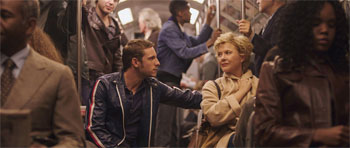 Paul McGuigan agrees with his producer. 'Everyone comes out of the screenings of this film and says that Jamie Bell is amazing."
Paul McGuigan agrees with his producer. 'Everyone comes out of the screenings of this film and says that Jamie Bell is amazing." It is the nuance that Jamie Bell brings to his performance that dazzles. 'He is one of those actors that you can put your camera on and he doesn't have to say anything yet he says everything," adds Paul McGuigan.
'He is so interesting. As a filmmaker you know you can go back to Jamie Bell and he will tell you what's going on in the scene without saying anything. He has got one of those faces that are so expressive. He plays Peter so well. He is no pushover and he really gets the whole dynamic of the family as well.
'You know that Annette Bening is going to pull it off," Paul McGuigan continues. 'You know that she is going to give you something special. I am not saying you don't know that with Jamie but for me he is the secret weapon we have with this movie."
For Jamie Bell, the role of Peter Turner was both multifaceted and highly rewarding. 'It is really a rollercoaster of a film for my character," the actor says. 'He goes through the gamut of everything – falling in love, losing someone, the pressures that come with all that stuff. Plus, his family is really on his case.
'It is adventurous as well," he continues. 'The nature of their relationship at that time was almost taboo with her being an older woman. There are so many layers to this guy, not least his loyalty and affection for this woman. I find the character exhilarating and I haven't seen anything like that in movies for a long time."
Working with Annette Bening was a gift, he says, especially given the unconventional nature of the characters' connection. 'They share a kindred sense of spirit and that was something I wanted to explore with a great actress like Annette Bening," he says.
He also appreciated the way in which Paul McGuigan approached the film. 'Thematically, there is a lot to do with memories and dreams and perspective," Bell says.
'When people realise through the film what kind of career Gloria had enjoyed, it will bring some perspective to the way she is living her life and the situation we find her in with this young English actor, and then her dying in his mum's bedroom in Liverpool.
'The contrast couldn't be more severe and Paul McGuigan has really used memories and dreams very fluently in this film."
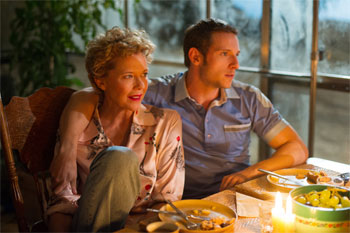 Jamie Bell particularly enjoyed the way in which Paul McGuigan transitions between certain scenes. 'Paul McGuigan has shot the film so that Peter walks out of the current, present moment with Gloria being very ill in Liverpool, and walks directly into a memory, whether that be in Los Angeles or New York or London.
Jamie Bell particularly enjoyed the way in which Paul McGuigan transitions between certain scenes. 'Paul McGuigan has shot the film so that Peter walks out of the current, present moment with Gloria being very ill in Liverpool, and walks directly into a memory, whether that be in Los Angeles or New York or London. 'Paul McGuigan really wanted a sense of fluidity of remembering and moving into the past, moving into memories and sometimes how those memories are warped from different people's perspectives. The use of that in the film is very original and it is a great way of telling a story. We also have an amazing cast across the board. I really wanted to be a part of this."
Family Values
The cast is brimming with talent, including Vanessa Redgrave, who dazzles in a memorable scene, playing Grahame's mother, Jeanne McDougall. Turner's family, meanwhile, includes Stephen Graham as his brother Joe Jnr, Kenneth Cranham as his father, Joe Snr, and Julie Walters as his mother, Bella.
The audience is introduced to Peter Turner's family when he brings Grahame back to their terraced house in Liverpool, entering into the middle of a heated discussion that's raging around the kitchen table.
'Another thing I really liked about this story was the idea of this woman who has been at the height of Hollywood, and who has been living in mansions and next door to famous people, and who has lived this incredible Hollywood life, ends up in this little working class house in Liverpool," says Paul McGuigan.
The bedroom in which Grahame stays looks like a memorial to the 1950s. 'And it is an amazing juxtaposition," adds the director. 'Then, of course, you have got this Hollywood accent and the Liverpool accent which is an interesting contrast, in the same way." One of those speaking in the Liverpool accent is Julie Walters, who returns to an area where she made such an impact in the likes of Educating Rita and the seminal TV series The Boys from the Black Stuff.
'The mum, as with many working class families, is the engine of the family, the matriarch," says Paul McGuigan. 'And Julie Walters plays that to a tee."
Walters revelled in the role. 'Bella is a matriarch and a proper working class, Catholic Liverpudlian woman," she says. 'I met lots of women like that in my youth when I lived up there for two or three years.
'She is a strong woman and poor old Joe Snr doesn't get a look in half of the time," she adds with a laugh. 'He does as he is told. I love strong women. You can see why Gloria is attracted to Bella, as a person. She's capable and strong and she is going to take care of things."
Like her director, Walters was attracted to the contrast between working class Liverpool and the glamour of old Hollywood. 'The fact that it is a true story is fascinating and the combination of Hollywood meets backstreet Liverpool is quite wonderful," she says.
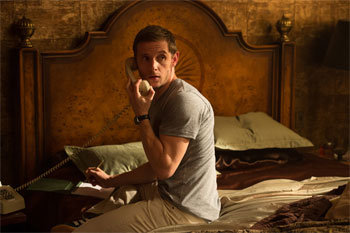 'Usually, those sorts of stories are about a clash of cultures but this isn't like that. Gloria is very ill but they all get on as if she isn't from Hollywood. I also loved the fact that Jamie was going to be in it and I thought how lovely to be able to work with Jamie again." The pair worked together on Bell's breakout movie, Billy Elliot.
'Usually, those sorts of stories are about a clash of cultures but this isn't like that. Gloria is very ill but they all get on as if she isn't from Hollywood. I also loved the fact that Jamie was going to be in it and I thought how lovely to be able to work with Jamie again." The pair worked together on Bell's breakout movie, Billy Elliot. 'Also, it was about having the chance to work with Barbara Broccoli," continues Walters. 'She has got a reputation for being fabulous and the whole experience has been wonderful."
Kenneth Cranham agrees. The actor, who plays Bella's husband Joe Snr, had worked with Walters on a production of Harold Pinter's The Birthday Party. 'I've known Julie for a long, long time and it's great to work with her again. She's such an accomplished actor. 'And it's been a wonderful film to make. There's a really interesting family dynamic, especially between Joe and Bella. He's always hoarding stuff and getting on her nerves!" The role of Joe Jnr, Peter Turner's brother, went to Stephen Graham. 'It was nice to do something in my own accent," laughs the Merseyside-born actor.
Graham especially enjoyed the relationship between the brothers. As is so often the case with brothers, there is mickey taking, a little tension, and plenty of love and respect. 'Peter is like the golden child in many respects because he is the one that's gone to London to find his fortune and it is a bit like the prodigal son returns," says Graham. 'Whereas, for my character, I am the everyday fellow. I am part of the furniture."
Paul McGuigan concurs, adding, 'Joe is one of those guys who is always there for his mum. He gets his tea at his mum's and then heads back to his own house. And there is a friction between Peter and Joe, which comes out of this idea of Peter being an actor and Joe thinking that it's a really prissy job. That creates tension."
For Graham, this particular experience was close to home. 'Joe's attitude towards Peter's job is very similar to my personal experiences," the actor confirms. 'I have loads of cousins and when I first started acting they took the piss. They used to call me a ponce and I've actually nicked a few lines from my experience and used them in the film."
There is, however, no malice behind the mickey taking. 'That is what a younger brother is born for, isn't it, for taking the piss out of?" he smiles. 'And while Joe thinks it is all right for him to call Peter a poncey actor, if anyone else said it he'd defend Peter all the way. He is really proud of him, though he doesn't like to admit it."
Graham goes on to say that he's been delighted to work with such an impressive cast. 'Jamie has been amazing on this. He is a fantastic actor and it has been brilliant to play off someone like him or Kenneth Cranham as my dad. And Julie Walters is just amazing. She's the finest. She is a hero of mine and a real icon."
Another iconic actress to feature in the film is Vanessa Redgrave, who stars in a scene set in LA, playing Grahame's mother, Jeanne. 'Vanessa is a legend and she really does make an impact in the movie because there is quite a long scene with her character," says Paul McGuigan. 'And Gloria's mum was quite eccentric."
Grahame's mother hailed from Scotland and worked in LA as an acting coach. 'She would go with Gloria everywhere when she worked in Hollywood," continues Paul McGuigan, 'and even when Gloria was older, mum would always be there, on set. She was one of those showbiz mums."
She was a Shakespeare enthusiast and educated Grahame on the classics of the theatre. 'Her mum is quite theatrical as well, so Vanessa was perfect," the director says. 'She totally got it and ran with it in this really great scene."
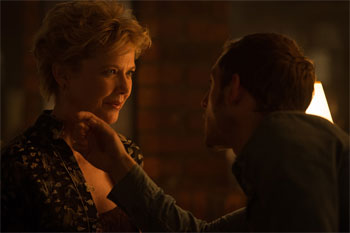 The scene is brimming with tension as Gloria's older sister Joy, played by Frances Barber, is full of needle. 'Joy really wanted to be Gloria," explains Paul McGuigan. 'She wanted to be an actress but her mum could see that Gloria had the talent so she concentrated all her efforts on Gloria and in the scene we have with them there's a great deal of tension between the sisters."
The scene is brimming with tension as Gloria's older sister Joy, played by Frances Barber, is full of needle. 'Joy really wanted to be Gloria," explains Paul McGuigan. 'She wanted to be an actress but her mum could see that Gloria had the talent so she concentrated all her efforts on Gloria and in the scene we have with them there's a great deal of tension between the sisters." The scene unfolds when Grahame takes Turner to meet her mother in LA and it features Annette Bening, Jamie Bell, Redgrave and Barber. 'Gloria married her step-son which caused a lot of controversy at the time, as you can imagine, and talk of it surfaces in this scene," continues Paul McGuigan.
'It's a great scene and a joy to watch. Annette and Vanessa Redgrave are like two conductors of this great acting foursome. It was one of those scenes where you just sit back and let it happen."
On Location With Film Stars
While the interiors and the locations in LA and New York were shot on set at Pinewood Studios, the production filmed establishing shots in Liverpool. Similarly, a house in Liverpool's Huskisson Street features as the exterior of the Primrose Hill guesthouse. Other real-life Liverpool locations that served in the film include Ye Cracke, a small and characterful pub that hosts an intimate scene between Turner and his father after he has brought Grahame back to the house, and also the highly ornate Philharmonic Dining Rooms, which stands in for a London pub in which Turner and Grahame go for a drink. One of the most notable Liverpool locations is the famous theatre, The Playhouse, which hosts a moving moment towards the end of the film with Turner and Grahame in which they read from Romeo & Juliet.
'When we first visited Liverpool with Annette, we went to The Playhouse," Paul McGuigan recalls. 'And as soon as we walked in Barbara went, -Oh! We have to shoot here!' We could have filmed those scenes somewhere else but The Playhouse is such a unique place so I'm very happy that we filmed them there. The Playhouse plays a big part in the film."
The Music Of Film Stars
The filmmakers used the real-life Peter Turner as a resource throughout production, but were especially grateful for his input when it came to the music. McGuigan wanted to know what songs he used to listen to while he was with Gloria. 'And there was some great music from '78 and '79, some brilliant Northern Soul and some disco," the director recalls.
As this was Grahame's story, too, Paul McGuigan also ensured he included a certain Elton John track, Song For Guy, which was a firm favourite of hers.
'It was important to remember that Liverpool is a very musical city," Paul McGuigan continues, 'hence we needed that Northern Soul, and we also have the New York scene of the '70s and then we have the early California sounds of the'60s and '70s as well.
'We wanted music that helped to create the atmosphere of this world because it is quite a heightened world on screen."
The end title track, You Shouldn't Look At Me That Way, is written and performed by acclaimed singer-songwriter Elvis Costello, whose own family hail from Liverpool. Costello was already aware of Grahame's life and work, and had incorporated her image into his stage show.
Hence, when Barbara Broccoli and Paul McGuigan arrived at the London Palladium to watch Costello perform, ahead of discussions about the possibility of collaborating on the film, they were surprised to see Grahame's picture appear on a TV screen during the song Church Underground. 'It must have been quite startling for Barbara Broccoli and Paul McGuigan," Costello laughs. Costello was already aware of Peter Turner's book, and is a very good friend of playwright Alan Bleasdale, whose work Peter Turner is performing at the start of the piece. 'When I saw Alan Bleasdale's name in the script," he says, 'it located that time and place even more vividly."
Needless to say, Costello's connection to the period, and the people involved in the story, feeds into the track. 'It is a song dealing with two people who have a lot of secrets," he explains. 'They were in a relationship and perhaps had difficulty seeing each other as they really were. One lover has some vanity but also a lot of vulnerability. 'The title really came from that," he adds. 'You Shouldn't Look At Me That Way could refer to a seductive gaze but also a plea not to be judged.
When writing a song, says Costello, the aim is to echo the filmmakers' themes and ideas. 'You want the song to have its own story, to be able to stand independently of the film, but it must also be in accord with the final images from the film with a message about the endurance of both pride and love."
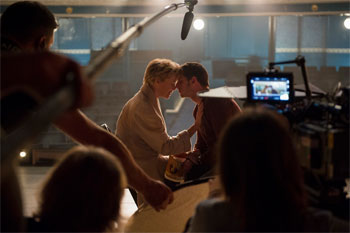 Sense & Sensivity
Sense & Sensivity For all the filmmakers, it bwas imperative that they not only tell a beautiful story but that they do so in a tactful and delicate manner. They had to be sensitive to Peter Turner's story and his experience.
Jamie Bell explains, 'Peter Turner is such a nice man, incredibly giving and incredibly loving. I can see why someone like Gloria Grahame would fall in love with him. And even now, all these years later, it is incredibly raw and incredibly visceral for him. This is his life and Gloria was a very important person in his life. In a way this experience shapes his life and defines him.
'So it was up to me, Annette Bening, Barbara Broccoli and Paul McGuigan to approach this with a lot of caution and care because this is someone's very personal experiences that we are now sharing with the world."
According to Annette Bening, the love they shared was unique. 'He was this young guy who grew up in a big family in Liverpool and she grew up in Hollywood," she says. She is much older; she had been a big movie star.
'She is not Marilyn Monroe but there is something very unique about her and, God knows, about her personal life. Then looking at this connection she had with Peter, I have ended up thinking that he must have been the gentlest, most loving, accepting person that she probably had ever been with. We need to show that."
Above all, says Barbara Broccoli, they wanted to respect Grahame's memory. 'And this film celebrates the amazing career that she had and the fact that she was so much her own person."
Vaines agrees. 'Gloria is such a very interesting character," he says. 'She was a real maverick and she never played the game in the Hollywood system. But she was very sexy and very beautiful and had this great sort of ironic sense of herself and of the characters that she played."
It was this side to her that Barbara Broccoli really admired. 'Gloria didn't give into the Hollywood system," she says. 'She always maintained her own sense of self and she was way ahead of her time. She was very pro the woman's movement and gay rights. She really fought for all those things. She was a remarkable woman and this is a special story."
Film Stars Don't Die in Liverpool
Release Date: March 1st, 2018
MORE
- Mission: Impossible Fallout
- Glenn Close The Wife
- Allison Chhorn Stanley's Mouth Interview
- Benicio Del Toro Sicario: Day of the Soldado
- Dame Judi Dench Tea With The Dames
- Sandra Bullock Ocean's 8
- Chris Pratt Jurassic World: Fallen Kingdom
- Claudia Sangiorgi Dalimore and Michelle Grace...
- Rachel McAdams Disobedience Interview
- Sebastián Lelio and Alessandro Nivola...
- Perri Cummings Trench Interview



